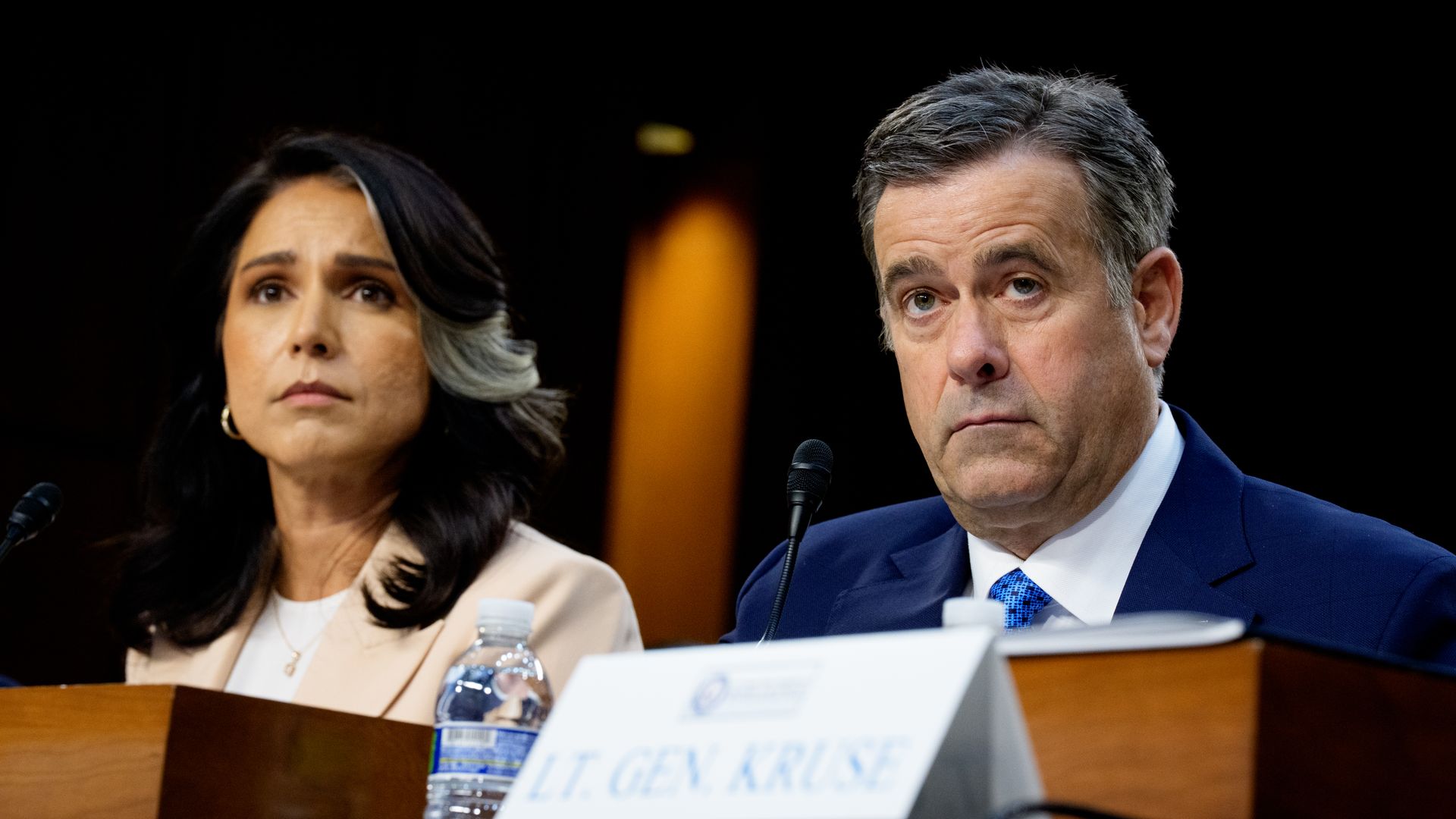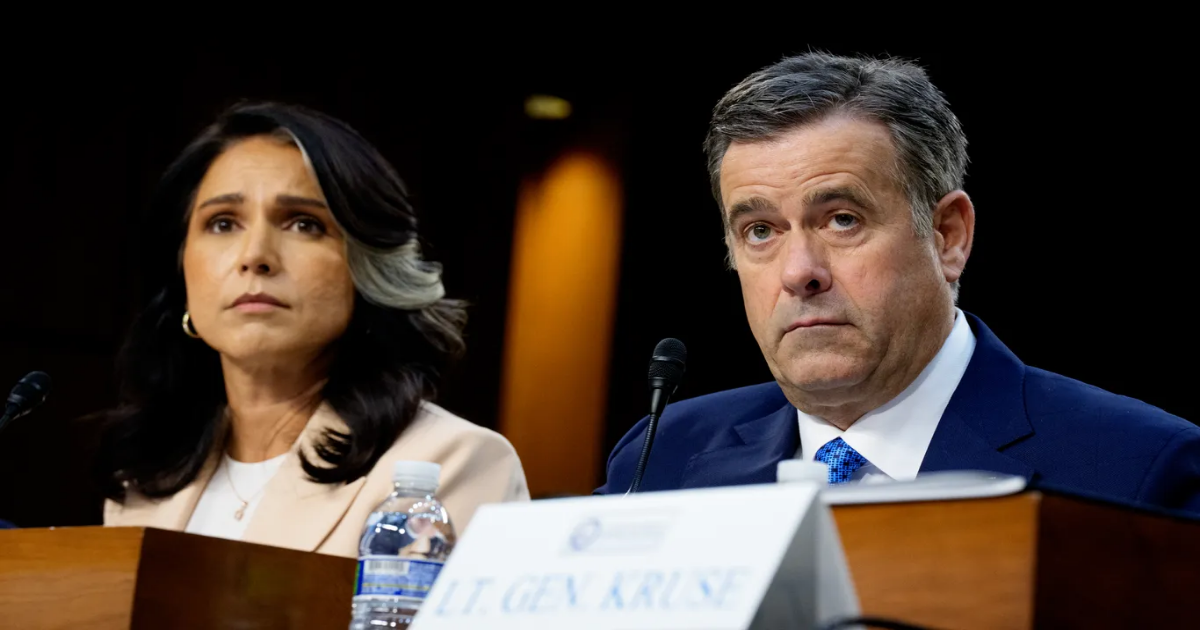 Gabbard and Ratcliffe testifying before Congress. Photo: Andrew Harnik/Getty Images
Gabbard and Ratcliffe testifying before Congress. Photo: Andrew Harnik/Getty Images
The Atlantic has called the Trump administration’s bluff, publishing in full the Signal messages about an upcoming attack on the Houthis in Yemen that were inadvertently sent to the magazine’s editor-in-chief, Jeffrey Goldberg.
Why it matters: The country’s top national security figures argued Goldberg was overhyping the scale of the intelligence breach, and claimed no classified information or “war plans” were shared. Now, the texts are available to the public.
How it happened: After Goldberg published a partial version of the texts, withholding key details for national security reasons, national security adviser Mike Waltz and Defense Secretary Pete Hegseth swiftly went into shoot-the-messenger mode.
- They both attacked Goldberg’s integrity and vehemently denied that any war plans were shared, while Waltz even suggested Goldberg may have gained access to the chat through some kind of subterfuge.
- White House press secretary Karoline Leavitt echoed those claims, calling Goldberg a “sensationalist.” (She also later objected to the release of the full text chain, per Goldberg.)
- Intelligence director Tulsi Gabbard and CIA Director John Ratcliffe testified on Tuesday that, to their knowledge, no classified information or details about operational planning were shared over Signal.
Here’s how those statements match with what we learned in the subsequent Atlantic story.
“No war plans”
Hegseth: “Nobody was texting war plans.”
From the texts: “THIS IS WHEN THE FIRST BOMBS WILL DEFINITELY DROP,” Hegseth texted, along with detailed sequencing of the operation.
State of play: Trump administration officials pointed to The Atlantic’s use of “attack plans” in its new headline to accuse the magazine of walking back its initial claims about “war plans.”
- There is a distinction in military parlance: “War plans” are typically more comprehensive, strategic frameworks that account for multiple scenarios, while “attack plans” usually pertain to a specific tactical operation.
- Hegseth mocked the “war plans” characterization: “No names. No targets. No locations. No units. No routes. No sources. No methods.”
- Critics say the White House is arguing over semantics, when the fact is plans for a forthcoming military operation were indeed shared on a non-classified system without actually verifying who was receiving them.
Goldberg got “sucked into” the group
Waltz to Fox News: “I’m not a conspiracy theorist, but of all the people out there, somehow this guy … gets on somebody’s contact and then get sucked into this group. … Now, whether he did it deliberately or it happened in some other technical mean is something we’re trying to figure out.”
The text screenshots from Goldberg’s device show a Signal notification that reads: “Michael Waltz added you to the group.”
State of play: Waltz has said an investigation is underway, while Goldberg has said his assumption is Waltz himself added him by accident.
“No classified info”
Gabbard under oath to the Senate Intelligence Committee: “I can attest to the fact that there were not classified or intelligence equities that were included in that chat group at any time.”
- Ratcliffe concurred, though both officials later deferred to Hegseth as the ultimate authority for classifying and declassifying Defense Department materials.
The texts include highly detailed information about the sequencing of an attack that had yet to take place.
- Under intelligence community guidelines, information “providing indication or advance warning that the U.S. or its allies are preparing an attack” should be treated as “Top Secret.”
State of play: The president and senior officials like the secretary of defense have considerable discretion over what information is classified, and whether to declassify it after the fact.
- But Gabbard and Ratcliffe declined to offer any explanation in the hearing as to why this information would not have been considered classified at the time it was inadvertently shared with Goldberg.
No “weapons packages, targets or timing”
Ratcliffe in the Senate hearing said he was not “aware” of any “information on weapons packages, targets or timing” that was discussed in the chat. Gabbard concurred.
The texts include a detailed sequencing of the timing of the attacks, to include Hegseth’s to-the-minute breakdown of when F-18s and drones would take off and drop their payloads.
- Hegseth even mentioned the precise minute that the window for striking the primary target’s known location would open. He also mentioned at least one weapons package: sea-based Tomahawk missiles.
State of play: Waltz has emphasized that no “sources or methods” were exposed — shorthand for information that could put U.S. intelligence assets or information gathering at risk.
- It’s also the case that the texts didn’t include, say, the specific coordinates for strikes. But they do clearly refer to specific timings and, in a more general sense, to weapons packages and targets.
Not a “huge mistake”
Ratcliffe answered “no” when asked if the entire Signal saga had been a “huge mistake.” President Trump and others have also downplayed the significance of the breach.
The texts did not leak until after the operation has concluded, likely limiting any harm to national security. But there’s a reason Goldberg’s accidental inclusion on the chain has dominated the news cycle this week.
Key quote: “The U.S. secretary of defense texted a group that included a phone number unknown to him—Goldberg’s cellphone—at 11:44 a.m. This was 31 minutes before the first U.S. warplanes launched, and two hours and one minute before the beginning of a period in which a primary target, the Houthi ‘Target Terrorist,’ was expected to be killed by these American aircraft,” Goldberg writes.
- “If this text had been received by someone hostile to American interests—or someone merely indiscreet, and with access to social media—the Houthis would have had time to prepare for what was meant to be a surprise attack on their strongholds. The consequences for American pilots could have been catastrophic.”



